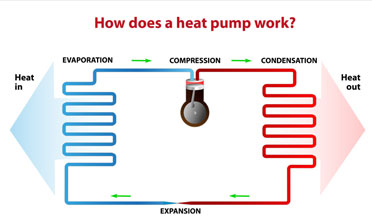Heat Pump 101
Choosing a Heat Pump for Your Home
Making a decision about the central heating and cooling system for your home will require working with a trusted HVAC professional since these systems are customized for each home. However, modern consumers have informed consumers and a little knowledge helps make determinations that affect the cost, comfort, and carbon footprint. The industry uses a lot of acronyms—starting with HVAC, which stands for heating, ventilation, and air conditioning system. First, let’s consider heat pumps.
Heat Pump Technology
Heat pump technology came into its own in the 1960s, just in time for the fuel oil shortages in the early to mid-1970s.
Heat pumps use a very effective method of moving heat with refrigerant gases, so the same process will move heat out of the house during the summer (for cooling) and move heat into the house during winter (for heating). Most heat pumps move and transfer heat to and from the outside air; water and geothermal variations are rare. Residences use three main types of heat pumps:
- A single package is one component, located outside, with ductwork bringing the conditioned air into the house.
- A split package has one component inside and one unit outside, the most typical application in U.S. residences.
- A hybrid system—a split system with an electric heat back-up for homes that experience temperatures that frequently drop below 250
Acronyms of Importance Regarding Heat Pumps
When you research heat pumps, expect to see these acronyms:
- BTU stands for British thermal unit. It is a measure of the heat energy needed to raise one pound of water 10 F at a given density. It helps determine the heat output of fuels or, in this case, heat pumps.
- KWh stands for kilowatt/hour. It is a measure of electricity—1,000 Watts of electricity per hour. It helps determine how much electric energy is being used. Your utility company measures your electricity usage with this measure and charges you by the KWh.
- SEER stands for Seasonal Energy Efficiency Ratio. This measures the energy efficiency of the air conditioning function of a heat pump. It measures the amount of BTUs removed from a home during the entire cooling season and compares it to the KWh of energy needed to make it happen. It is the same principle as miles/gallon.
- HSPF stands for Heating Seasonal Performance Factor. This measures the energy efficiency of the heating function of a heat pump. It measures the amount of BTUs moved into a home during the entire heating season and compares it to the KWh of energy needed to make it happen.
While doing heat pump research, you will see both a SEER rating and an HSPF rating. The Department of Energy (DOE) determines quality control tests, requires each heat pump design to be tested and assigns ratings accordingly.
What Type of Ratings Should You Expect?
SEER Ratings. The DOE set the minimum SEER rating for new heat pump units at 10 in 1992. Because engineering technology has advanced the design of air conditioning systems, currently the minimum SEER rating allowed is 13 or 14, depending on your region. It is expected to rise to 14 to 15 by 2023. Heat pumps have achieved a SEER rating of 22 so far.
HSPF Ratings. The DOE set the minimum HSPF rating for new heat pump units at 6.8 in 1992. Because engineering technology has advanced the design of heating systems, currently the minimum HSPF rating allowed is 8.2, but it is expected to rise to 8.8 by 2023. Heat pumps have achieved an HSPF rating of 13 so far.
All new units should have at least the current minimum rating for both SEER and HSPF; a decision based on forward-thinking should at least consider the proposed 2023 ratings. Energy-efficient heat pumps will have both a high SEER rating and a high HSPF rating. As you might expect, high-efficiency heat pumps will come with a high initial cost.
Converting Energy Efficiency Heat Pumps to Cost Savings
One last thing. Some are excited to participate in reducing the carbon footprint by buying energy-efficient products, but we also know that it comes with a price tag. Here are three considerations to keep everything in the proper perspective.
- Use the ratings to decide which HVAC system will save you the most. If you live in a hot climate, the SEER rating should be more important than the HSPF rating. If you live in a colder area, the HSPF should take the center of attention.
- Use the ratings to determine cost savings. This will require the help of your HVAC professional with system size analytics, local utility rates, and unit ratings. In short, you compare a unit that can change 9 BTU of heat with 1 KWh to a unit that can change 10 BTU of heat with 1 KWh. Figure in the cost/KWh to calculate cost savings.
- Determine the difference in price between the standard rated unit and the more energy-efficient unit.
- Explore incentives by Federal and State agencies as well as local utility companies and reduce this from the increase in cost.
After you crunch the numbers, you will find that the complete payback period for the energy-efficient unit(s) will be between two and three years. Every year of use that follows will result in direct savings to your heating and cooling budget.
Questions About Heat Pumps?
Our four decades of experience as an HVAC System maintenance contractor, AirPro Houston provides you with the skill and expertise to assist in Heat Pump decisions.
We have several financing options available with great options with up to 72-month terms with approved credit. Call us today at 281-880-8805 and let us partner with you for all of your HVAC repair and installation needs.

